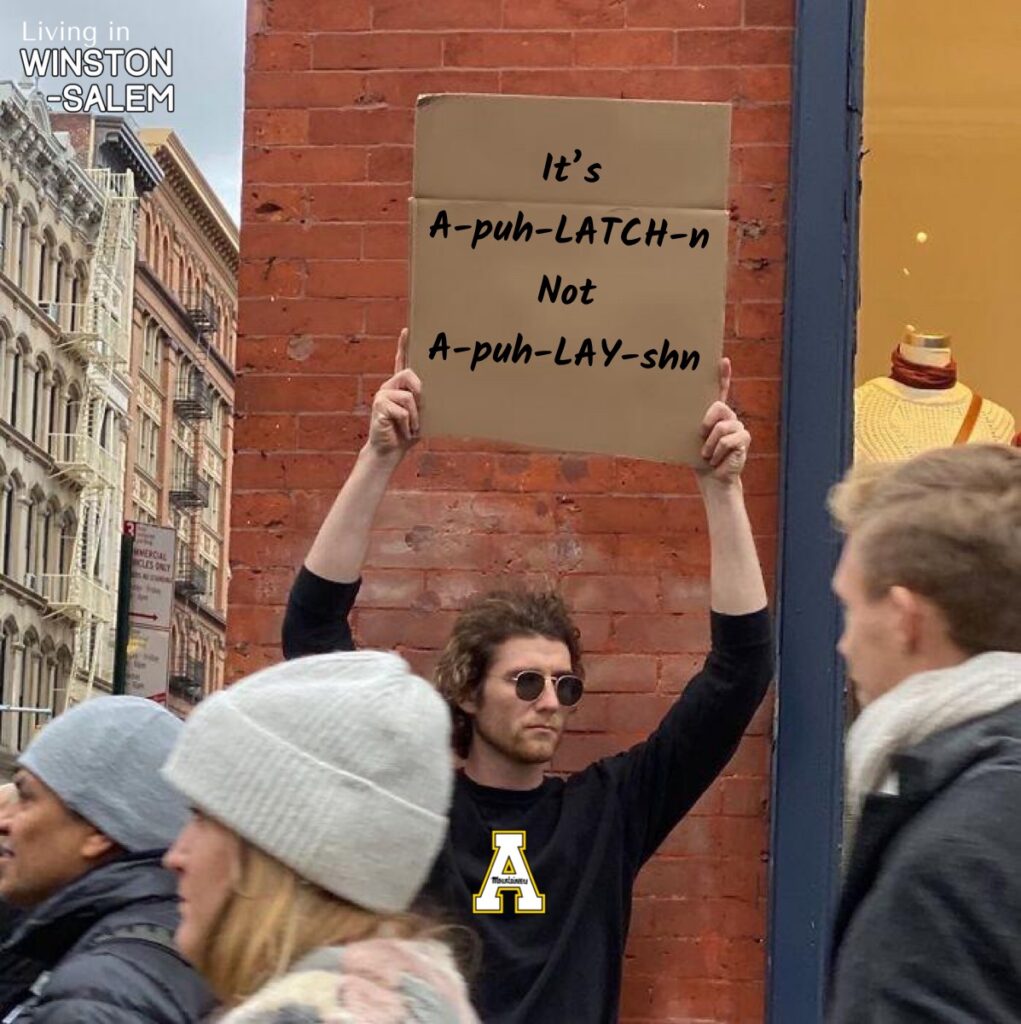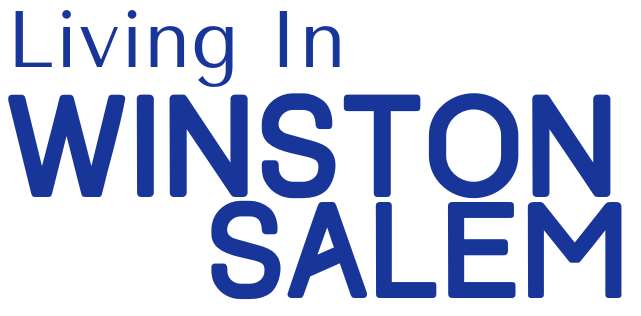Part 1: Your Guide to Winston-Salem Orthoepy
We admit we do things a little differently down here in Winston-Salem. If you aren’t from North Carolina, there are cultural differences you’ll adjust to, and one of them is the various pronunciations of county, town, and street names.

Why is correct pronunciation important?
For Winston-Salem locals, pronunciation exercises are fun because we get a good laugh talking about our unique dialect. Most Winston locals want newcomers and visitors to feel included, so don’t be offended if someone corrects you on a mispronunciation.
Here in the Piedmont Triad, we’re set in our ways since many of our townships, counties, and streets are named to honor a person or group and have meanings associated with a last name, ethnicity, culture, or religion. On the other hand, some pronunciation standards are looser. For example, any place ending in “ville” is generally pronounced, “vul.” Most locals won’t mind if you say “vul,” which is why the guide has two parts. Part 1, below, includes pronunciation absolutes. Part two, to come, is for people serious about blending in with the local townies.
Advance: Add-Vance
Advance, with the stress on the first syllable, is an unincorporated community in Davie County, 20 miles outside Winston-Salem. Various accounts exist for the origin of the town’s name. Some suggest the name was derived from the name of a resident and formerly enslaved person, Samuel Vance Allen. Others believe the name comes from the 1800s when the community, known as Shady Grove, hoped the community would ‘advance’ by adding a post office.
Alleghany: AE-l-uh-g-AI-n-ee
This county name comes from either the Allegewi American Indian tribe or the Delaware tribe’s word “oolikhanna,” which means beautiful stream. The largest town in the county, Sparta, is 74 miles outside of Winston-Salem.
Appalachian: App-uh-latch-in
While visiting France, you probably wouldn’t insist that the correct pronunciation of the country’s capital is “Pair-is,” not “Pair-ee.” The same rule applies when referring to North Carolina’s Appalachian Mountains. In U.S. southern region dialects, the pronunciation is “App-uh-LATCH-in.” We’re not here to right-fight but know that while it’s acceptable to say “App-uh-lay-shin” in the northern mountain region, that pronunciation is wrong. For a brief history lesson, the members of the Narváez expedition found a Native American village near present-day Tallahassee, Florida, whose name they transcribed as Apalachen [a.paˈla.tʃɛn]. Now spelled “Appalachian,” it is the fourth-oldest surviving European place name in the U.S. (and the first-most commonly mispronounced European place name in the U.S.).
Bethabara: Beth-ab-bra
Bethabara Historic District encompasses the surviving buildings of a Moravian community that settled in 1753. Located in present-day Winston-Salem, it is now a city public park.
Belews Creek: Blues Creek
Belews Creek, originally named “Belews Creek Mill,” is an unincorporated community in Forsyth County, 27 miles outside Winston-Salem.
Boonville: Boon-vul
We mentioned towns that end in “ville” at the beginning of this article have a loose pronunciation rule, but Boonville is an exception. Boonville, 37 miles outside Winston-Salem, gets its name from Daniel Boone, an American pioneer whose exploits made him one of the nation’s first folk heroes.
Buena Vista: Byoo-nuh Vih-stah
Locals won’t fault you for botching the “southern” pronunciation of this prominent neighborhood, which is (clearly) a Spanish name. We’ll say this – don’t trust someone trying to sell you something hyper-local, like real estate, for instance, who says, “Bway-nuh Vih-stah.”
Concord: Con-kord
Concord, 60 miles outside of Winston-Salem, is the county seat of Cabarrus County. The pronunciation of Concord in North Carolina differs from the Concord in Massachusetts, “Con-kerd.”
Cooleemee: Cool-uh-mee
Cooleemee, 30 minutes outside Winston-Salem, is in Davie County on the Yadkin River. Originally a plantation, the property was gifted and handed down until it landed in the ownership of Gen. Jesse Pearson. He called it Cooleemee, apparently the name of an American Indian village in Alabama, where Pearson served in the Creek War. Many believe the name means “place where the white oaks grow.”
Cullowhee: Cull-uh-whee
Home of the Western Carolina University Catamounts, Cullowhee is a three-hour drive West of Winston-Salem in the North Carolina mountains. The town was originally Kullaughee Valley, an Indian word meaning “place of the lilies.”
Ebert Street: Eh-bert
Unaware visitors will call this Winston-Salem street name “Ee-bert Street” and are immediately met with the response, “You’re not from around here, are you?” Ebert is a last name, so the street shares the same pronunciation.
Forsyth: Four-SYTH or Fur-SYTH
Winston-Salem is in Forsyth County. The emphasis when pronouncing Forsyth is on the “syth” rather than the “for,” so you say, “ForSYTH,” not “FOUR-syth.”
The county name honors Colonel Benjamin Forsyth, a real estate guru in Stokes County. Colonel Forsyth distinguished himself in heavy fighting during the War of 1812 at Odelltown, Canada, where he was mortally wounded.
Iredell County: ai-ur-del
A common mispronunciation is “Eye-RUH-dell.” Iredell County, 50 miles outside Forsyth County, gets its name from N.C. Attorney General Judge James Iredell during the Revolutionary War and a delegate to the Constitutional Convention of 1788.
Pfafftown – POFF-town
Pfafftown, 9 miles outside Winston-Salem and home of the inventor of windsurfing, is an unincorporated community partially annexed into Winston-Salem. John Henry Pfaff (1858-1949) was the great-grandson of Peter Pfaff (1724-1804), who settled in the Pfafftown area in 1786.
Reynolda: Reh-null-duh
Reynolda, the former estate of R.J. Reynolds, is pronounced like Reynolds, “Reh-null-duh,” although some say, “Ruh-nol-da,” which is also acceptable.
Rowan County: roe-ANN
Rowan, not “ROE-in,” is a county named after Matthew Rowan, a British colonial who was the acting governor of North Carolina from 1753 to 1754. Rowan County is 45 miles outside Forsyth County.
Salisbury: Sauls-berry
Salisbury, 40 miles outside Winston-Salem, is the county seat of Rowan County. The town received its name in honor of the city in England.
Sprague Street: Sprag
Sprague Street is one of the main thoroughfares running through the Waughtown district of Winston-Salem. Frank Julian Sprague (1857-1934) invented the Sprague electric motor, which ran all the streetcars in town.
Transou: Tran-sue
Transou, located in Ashe County, is 70 miles outside Winston-Salem. You’ll have to take our word on this one because good luck finding anything about this township. Transou is likely a last name. Admittedly, we may have butchered the original pronunciation, “Tran-sow.”
Waughtown: WAH-town
Named after James Waugh, the Waughtown-Belview Historic District (commonly called ‘Waughtown’) is in southeast Winston-Salem.

